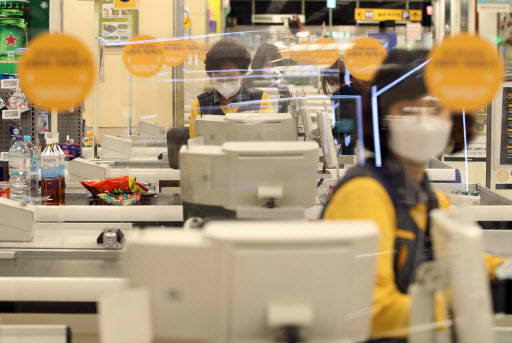With no return to pre-virus normalcy, S. Korea releases ‘routine distancing’ rules
SEOUL — South Korea’s government has released a detailed draft of “routine distancing” guidelines that the public should follow to fight the novel coronavirus, saying the pandemic could last as long as two years and there is no going back to pre-coronavirus normalcy.
As Korea has seen a slowdown in new cases following social distancing campaign that began on March 22 across the country, the government is moving to transition to “routine distancing,” which will allow citizens to return to their normal daily lives while combating the spread of the virus.
“Experts here and overseas are expecting that the COVID-19 pandemic will last for up to two years. We should accept the reality that it will be difficult to go back to pre-COVID-19 normalcy and we should wisely prepare for the future,” Vice Health Minister Kim Gang-lip said at a briefing Friday, explaining why the government was preparing for the transition.
Still, Kim asked the public to stick to social distancing until Children’s Day on May 5, mindful of Korea’s busy holiday calendar which also has Buddha’s Birthday on April 30.
The “routine distancing” guidelines detail how citizens should behave in specific places and situations to prevent the spread of the coronavirus when the social distancing campaign is lifted, and when the affected economic and social activities are resumed.
Devised by 12 ministries, the guidelines cover almost every situation that people could face in their daily lives — from workplaces and public transportation to hotels and shopping malls.
Common rules include: refraining from going outside when people have symptoms such as fever higher than 37.5 or when they are just back from a trip overseas, wearing a mask both inside and outside, washing hands for 30 seconds, ventilating a residence more than twice every day and keeping a two-meter distance from others.
There should be at least one person designated at public facilities to take charge of overseeing quarantine measures.
The draft guidelines, which have no legally binding force, are available at the Ministry of Health and Welfare’s website (mohw.go.kr). They will be finalized and distributed after collecting opinions from members of the public, the authorities said.
On Friday, Korea reported six new coronavirus cases, according to the Korea Centers for Disease Control and Prevention, with the number of new infections hovering around 10 for the past week. Korea saw a single-digit increase on Sunday — eight new cases — for the first time in two months.
The country’s total infections stand at 10,708, with 8,501 of them, or about 80 percent, having been released from quarantine after making a full recovery.
There was no additional death reported in Friday’s 24-hour update, for the first time in 39 days. The death toll stands at 240, with the overall fatality rate at 2.24 percent. The fatality rate is much higher for those in their 70s, at 10.03 percent, and those in their 80s and above at 23.51 percent.
Of the six new cases, two came from overseas. The total number of imported cases reached 1,023, accounting for 9.5 percent of the country’s total cases. Nearly 92 percent of the imported cases involve Korean nationals.
The number of new infections continued to slow in Daegu, the city hit hardest by the virus in Korea, with just two new cases, though it still represents around 64 percent of the country’s total.
The virus curve in Korea, which reached a peak of 909 new cases on Feb. 29, started to flatten out in mid-March as the number of new infections started to hover around 100 on the back of a social distancing campaign, rapid testing and extensive contact tracing.
For more news about the novel coronavirus click here.
What you need to know about Coronavirus.
For more information on COVID-19, call the DOH Hotline: (02) 86517800 local 1149/1150.
The Inquirer Foundation supports our healthcare frontliners and is still accepting cash donations to be deposited at Banco de Oro (BDO) current account #007960018860 or donate through PayMaya using this link.
